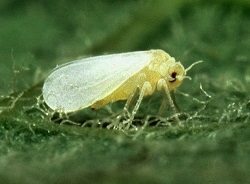22
Aug
Pesticide Resistant Whitefly in U.S. Points to Need for Organic Management Strategies
(Beyond Pesticides, August 22, 2016) An invasive whitefly that is resistant to pesticides has been found outdoors in the U.S. for the first time, prompting a public discussion hosted by the University of Florida Extension Miami-Dade in Homestead, Florida on July 29. And while the fears amongst fruit and vegetable growers over crop devastation are valid, little attention has been paid to the viability and effectiveness of organic and cultural management practices in preventing and managing whiteflies. Meanwhile, chemical intensive agriculture, which is dependent on insecticides to control whiteflies, is harming the same beneficial insects that act as natural predators to the whitefly.
 The pest, a Q-biotype of the sweet potato whitefly, Bemisia tabaci, has been present in greenhouses around the U.S. since 2004, when it was first found in Arizona. According to Florida Agriculture Commissioner Adam Putnam, this pest “poses a serious risk to Florida’s $120 billion agriculture industry and the more than two million jobs it supports.”
The pest, a Q-biotype of the sweet potato whitefly, Bemisia tabaci, has been present in greenhouses around the U.S. since 2004, when it was first found in Arizona. According to Florida Agriculture Commissioner Adam Putnam, this pest “poses a serious risk to Florida’s $120 billion agriculture industry and the more than two million jobs it supports.”
Whiteflies are tiny, fluid-sucking insects that thrive in warm weather and become abundant in ornamental and vegetable plantings. This particular species breed year round and large colonies often develop on the undersides of leaves. Whiteflies draw fluid of out a plant and emit a sticky residue, known as honeydew, which can lead to mold growth and makes it more difficult for the plant to photosynthesize properly.
This type of whitefly is problematic to growers who depend on toxic pesticides to manage their systems, because it has extremely high resistance to the insecticides, pyriproxyfen and imidacloprid, compared to other types of whitefly populations in the U.S. Pesticide resistance in whiteflies has been documented in many other regions of the world in the past several decades, due to a constant cycle of insecticide use in ornamental and vegetable production around the world. This has enabled a building of a resistant strain of insects who pass on their resistance to their offspring. The fact that pesticides with similar modes of action are used repeatedly to control these pest populations is problematic and leads to these products losing their efficacy.
In addition to resistance issues, the overuse of insecticides such as imidacloprid to control for sucking insects like whiteflies is negatively affecting non-target species, particularly pollinators, and other beneficial species. Imidacloprid is also a major public health concern and is linked to reproductive effects and genetic damage in addition to being neurotoxic.
Pesticide resistance is not a new issue, and the pesticide treadmill will continue to escalate as farmers repeatedly move to even more toxic chemicals to treat what become difficult pests. Because of this, Beyond Pesticides advocates for organic management approaches that encourages biodiversity and holistic management practices which are proven to be effective in both the short- and long-term. Underpinning the success of organic in the U.S. are small-scale producers who focus on fostering biodiversity, limiting external inputs, improving soil health, sequestering carbon, and using integrated holistic approaches to managing pests, weeds, and disease. For more information about the benefits of organic agriculture, see Beyond Pesticides’ organic program page.
All unattributed positions and opinions in this piece are those of Beyond Pesticides.
Source: AFP











Spray made with cold-pressed 100 percent neem oil should be given a try.
August 23rd, 2016 at 3:39 pm